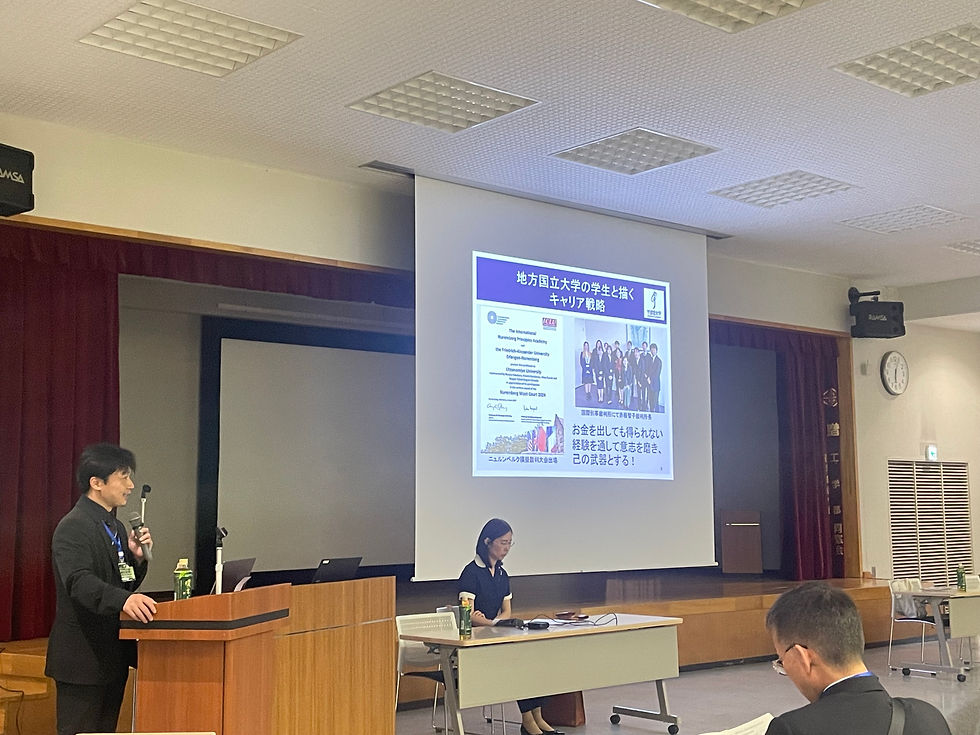M2 Reona FUKUHARA
I have completed my eight-year student journey under the guidance of my supervisor, Professor Fujii. In this essay, I would like to introduce some memories from my student life briefly.
Academic Activities
During my master's program, I had a valuable opportunity to work as a researcher at the Mission of Japan to the African Union (AU) in Ethiopia for two years (Please see: https://www.fujiih.com/post/2-year-experience-in-ethiopia). Upon returning to Japan, I was fortunate to present my research about the AU at various conferences, including those by the Japan Associate of Global Governance and The Japan Society For International Development (JASID). At the Japan Associate of Global Governance, with supports from other students, I analyzed an impact of the AU's transitional policy, using the case of northern conflict in Ethiopia. Additionally, at the 26th JASID, my research team examined that the AU is becoming a strong negotiator in international relations by creating new rules and norms as a voice of the African continent. This research encouraged us to reconsider the Japan-Africa relationship. "I was able to apply my field experience to my research, which ultimately led to policy recommendations. In this sense, through my research activities, not only was I able to refine my investigative skills, but I also became more conscious of how to present my work in a way that would attract the interest of a larger audience, which was a significant growth of me compared to a couple years ago.

(Photo 1: Poster presentation at The Japan Society For International Development)
In addition to the research activities mentioned above, I had the opportunity to participate as a speaker at various career seminars. For instance, I have shared my experience in Ethiopia on the occasion of the 25th JASID plenary session "Realizing International Cooperation and Interactive Co-creation in Local Context Global and Glocal Human Resource Development". I was also invited to speak at a career seminar on International Peace and Coexistance organized by Hiroshima University. Thanks to these experiences, I gained the confidence to find myself standing as a speaker at a career seminar—something I never imagined when I was in my bachelor's degree and searching for a role model to shape my career.

(Photo 2: Photo of the plenary session)
Field Activities
As a summary of my student life, I had the privilege of participating in the Jean-Pictet Competition in Turkey, followed by a visit to the Netherlands, where I had the opportunity to visit the Japanese Embassy in the Netherlands and the International Criminal Court. The Jean-Pictet Competition is one of the most renowned and distinctive competitions in the field of International Humanitarian Law (IHL), attracting both humanitarian professionals and students aspiring to build careers in IHL (For more information, see here). Participating in this prestigious competition not only allowed me to enhance my ability to analyze complex legal scenarios under high pressure but also provided communities and the broader humanitarian field.

(Photo 3: With participants of the Jean-Pictet Competition)
Following the competition, my team visited the Netherlands and met Professor Fujii, who is working at the ICC as an Associate Analyst in the Country Analysis Unit-Registry. With the generous support of Professor Fujii, my team visited the ICC and the Japan Embassy in the Netherlands. In particular, we had the valuable opportunity to exchange views with the ICC staff on the vision and challenges in the field of international criminal justice and their thoughts on supporting the victims of conflict. Those experiences significantly broadened my understanding of the ICC's operations. They deepened my knowledge of Japan's policy towards the Court, offering me an enriched perspective on the intersection of international law and humanitarian work.

(Photo 4: In front of the ICC)
For the Next Journey
As I stand at the threshold of a new chapter in my life, I look toward my future career at the Japan International Cooperation Agency (JICA) with great anticipation and a sense of responsibility. One of the key reasons I am excited about joining JICA is the agency's emphasis on human-centered development. Through its projects, JICA works to enhance the capabilities of local communities and governments, helping them to achieve self-sufficiency and long-term sustainability. By working with JICA, I hope to be part of initiatives that create lasting positive change in the lives of individuals and communities.
Moreover, my participation in competitions such as the Jean-Pictet Competition has given me invaluable insights into the importance of collaboration and communication. These experiences taught me how to articulate complex ideas, engage with stakeholders from different backgrounds, and adapt to various cultural contexts—all of which are essential competencies when working in international development. I am also aware that working in international cooperation means encountering obstacles such as political and economic instability, limited resources, and sometimes conflicting priorities among stakeholders. However, I am confident that the lessons I have learned will serve me well in solving these challenges.
In conclusion, I believe that joining JICA marks the beginning of a new, exciting chapter. I look forward to using the knowledge and skills I have gained to help build a more equitable and sustainable world.

* I am deeply grateful to Professor Fujii for his guidance and all the seminar members' valuable advice and thoughtful questions throughout my activities. I sincerely thank them.








